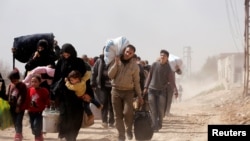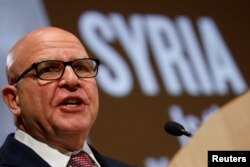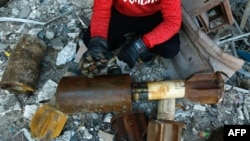The United States is demanding the world hold Syria's government, Russia and Iran responsible for what a top official calls "some of the worst atrocities known to man."
The statement, by U.S. national security adviser H.R. McMaster, came Thursday during an event at the U.S. Holocaust Museum in Washington marking the seventh anniversary of the start of the Syrian conflict.
"The Assad regime has killed indiscriminately, tortured, starved, raped and used chemical weapons on its own people," McMaster said, referring to the government of Syrian President Bashar al-Assad. "It has attacked hospitals and schools, and countless Syrians have been arrested, abducted or simply disappeared."
But McMaster, one of the most senior advisers to U.S. President Donald Trump, also accused Russia and Iran of enabling Assad, and said they, too, must be held accountable.
"All nations must respond more forcibly than simply issuing strong statements," McMaster said. "Assad should not have impunity from his crimes and neither should his sponsors."
Political, economic pressures
So far, McMaster and other U.S. officials have emphasized an approach using political and economic pressure, pointing to ramped-up sanctions against both Iran and Russia.
"The president and General McMaster are continuing to work together to put pressure on Russia to do the right thing," White House press secretary Sarah Huckabee Sanders told reporters when asked about McMaster's comments.
"Again, I think you can see what the administration's viewpoint is simply by looking at the actions that we took today by placing new sanctions on Russia," Sanders said.
But while the U.S. has repeatedly criticized Russia, Thursday's sanctions were not aimed at its support for the Syrian regime.
Instead, the actions were aimed at five entities and 19 individuals accused of interference in the 2016 U.S. presidential election and for cyberattacks targeting U.S. infrastructure.
There are also questions about how far the Trump administration is willing to go to stop attacks on civilians in Syria, including in eastern Ghouta, a suburb of Damascus that has been bombed repeatedly by Russia and Syria.
"The U.S. seeks to halt Assad's atrocities and constrain and ultimately reduce the buildup of Iranian proxy forces and Iranian influence in Syria," said Jennifer Cafarella, with the Washington-based Institute for the Study of War. "The means the U.S. is willing to use will not accomplish the stated goals."
And there are few signs the U.S. is going to change course, at least for now.
"We urge Russia to compel the Assad regime to stop killing innocent Syrians and allow much-needed aid to reach the people of east Ghouta," chief Pentagon spokeswoman Dana White told reporters Thursday.
"We are going to be consistent in that message and we are going to continue to urge them to do that," she added.
When pressed on whether the U.S. military would consider taking any action to help ensure the safety of civilians, White said that Syria's Assad would be "ill-advised to use any gas [chemical weapons]."
U.S. action against Syria
The U.S. has taken action against Assad once before, launching a barrage of 59 cruise missiles at Shayrat airfield, in western Syria, in April 2017. Officials said it was in retaliation for a gruesome sarin gas attack by Assad's forces that killed about 100 civilians.
But despite more recent reports alleging Assad's use of chemical weapons and chlorine gas, the U.S. has not acted. Military officials say while they are looking into the reports, they have yet to find conclusive evidence that chemical weapons were used.
There are also no indications that Washington, which has said a political settlement is the only way forward, is willing to use air power or ground forces already in the region to stop the onslaught against civilians, including the most recent bombing campaign in eastern Ghouta, or to forcibly remove Assad from power.
"Our mission in Syria is to defeat ISIS," said the Pentagon's White, using an acronym for the Islamic State terror group. "It is not our intention to be part of a civil war. … We are pushing toward the Geneva process."
On Wednesday, the commander of the U.S. military's Central Command, General Joseph Votel, told lawmakers he would advise against the use of military force.
"I don't recommend that at this particular point," Votel said. "Certainly, if there are other things that are considered, you know, we will do what we are told."
But when asked whether Assad, with the backing of Russia and Iran, had "won" the civil war in Syria, Votel suggested that was the case.
"I do not think that is too strong of a statement," Votel said.
VOA's Steve Herman contributed to this report from the White House.







